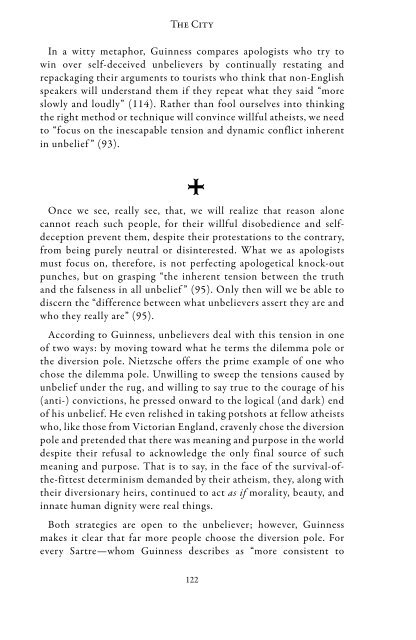THE CITY
h6c7p5d
h6c7p5d
You also want an ePaper? Increase the reach of your titles
YUMPU automatically turns print PDFs into web optimized ePapers that Google loves.
The City<br />
In a witty metaphor, Guinness compares apologists who try to<br />
win over self-deceived unbelievers by continually restating and<br />
repackaging their arguments to tourists who think that non-English<br />
speakers will understand them if they repeat what they said “more<br />
slowly and loudly” (114). Rather than fool ourselves into thinking<br />
the right method or technique will convince willful atheists, we need<br />
to “focus on the inescapable tension and dynamic conflict inherent<br />
in unbelief ” (93).<br />
o<br />
Once we see, really see, that, we will realize that reason alone<br />
cannot reach such people, for their willful disobedience and selfdeception<br />
prevent them, despite their protestations to the contrary,<br />
from being purely neutral or disinterested. What we as apologists<br />
must focus on, therefore, is not perfecting apologetical knock-out<br />
punches, but on grasping “the inherent tension between the truth<br />
and the falseness in all unbelief ” (95). Only then will we be able to<br />
discern the “difference between what unbelievers assert they are and<br />
who they really are” (95).<br />
According to Guinness, unbelievers deal with this tension in one<br />
of two ways: by moving toward what he terms the dilemma pole or<br />
the diversion pole. Nietzsche offers the prime example of one who<br />
chose the dilemma pole. Unwilling to sweep the tensions caused by<br />
unbelief under the rug, and willing to say true to the courage of his<br />
(anti-) convictions, he pressed onward to the logical (and dark) end<br />
of his unbelief. He even relished in taking potshots at fellow atheists<br />
who, like those from Victorian England, cravenly chose the diversion<br />
pole and pretended that there was meaning and purpose in the world<br />
despite their refusal to acknowledge the only final source of such<br />
meaning and purpose. That is to say, in the face of the survival-ofthe-fittest<br />
determinism demanded by their atheism, they, along with<br />
their diversionary heirs, continued to act as if morality, beauty, and<br />
innate human dignity were real things.<br />
Both strategies are open to the unbeliever; however, Guinness<br />
makes it clear that far more people choose the diversion pole. For<br />
every Sartre—whom Guinness describes as “more consistent to<br />
122


